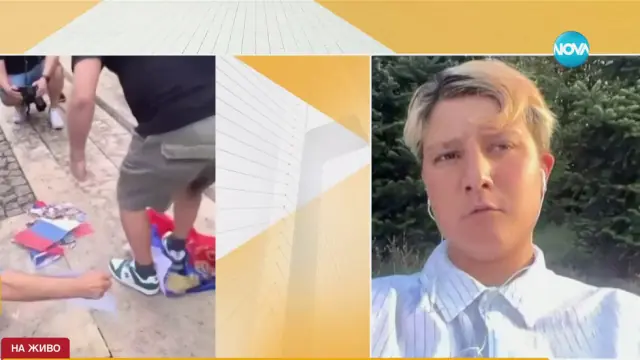
In Sofia this morning, Alexandra Mileva, a young Bulgarian fine arts student, shared her story with Nova TV following a high-profile protest in front of the Russian Cultural and Information Center.
Mileva’s protest involved setting fire to the Russian flag and scrawling the word “murderers” on the ground, an act she says was driven by her harrowing experiences in Donbas.
Mileva, who recently returned from Donbas, described the dire conditions she witnessed in the war-torn region. She recounted sheltering in a Ukrainian grandfather’s basement, with drones buzzing overhead and bombs exploding nearby.
“In my opinion, it is unacceptable for a country to attack its neighbor in such a manner, which is why I chose to protest,” Mileva explained. Her actions, she said, were a response to the atrocities she had seen and a way to voice her opposition to the ongoing conflict.
Following her protest, Mileva spent 23 hours in police custody. Despite the detention, she was informed by the authorities that she had not breached any laws, although they expressed frustration over the incident, noting the displeasure of the Russian community. “The police were irritated, but they said I hadn’t broken any laws,” Mileva reported.
The 25-year-old, who is pursuing her master’s degree in fine arts from a New York institution, was in Ukraine working on a scientific film project.
Although she clarified that her protest was not a condemnation of all Russians, she emphasized that the flag she burned symbolized the forces responsible for the invasion of Ukraine.
“I don’t blame all Russians for the actions of their government, but the flag represents the same forces that have invaded Ukraine,” she said.
Mileva’s protest quickly escalated to a legal matter, with a trial held under the Petty Hooliganism Ordinance. However, her legal team successfully argued her case, leading to her acquittal.
“Thanks to my lawyers, I was acquitted,” Mileva stated. The judge ruled in her favor, marking a significant legal victory for her.
The case has attracted considerable attention, reflecting broader tensions surrounding the conflict between Russia and Ukraine and the various ways individuals are expressing their dissent.
Mileva’s protest, while controversial, highlights the personal and political impacts of international conflicts on individuals far from the front lines.
As the situation in Ukraine remains volatile, Mileva’s story underscores the complex interplay between personal activism and international diplomacy.
